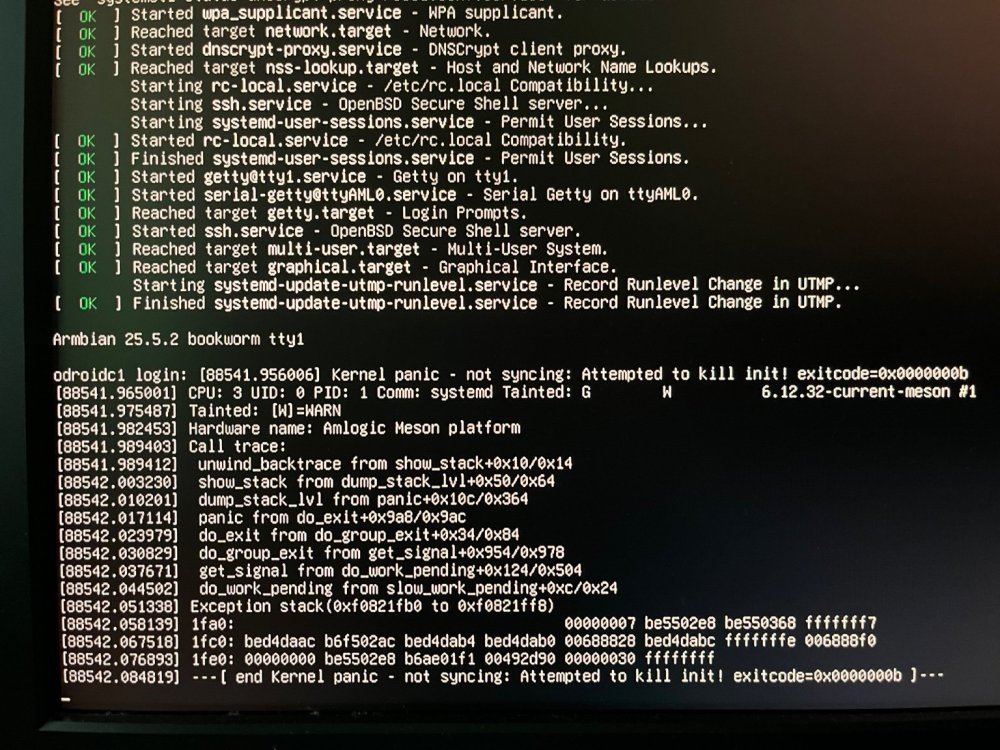Active threads
Showing topics posted in for the last 365 days.
- Past hour
-

Any chance we will be seeing new kernel versions for the 5 Max
The Tall Man replied to DiegoBM's topic in Rockchip
Awesome! Thanks so much for this! I see they're addressing some key issues, such as NPU functionality and fixing the ES8388 audio issue with the Orange PI 5 Plus (the board I have). This is terrific!! - Today
-
Can you please explain what you mean by this ? Am I supposed to install it on the host ? If so, this solution is not working for me. I am trying to compile armbian with docker from arch, it worked a few months ago but now it doesn't Same error as original poster.
-
Hi. I have Rock Pi S0 boards that I install in an enclosure. It works, but it is conceivable that some critical bug or change with the image is discovered in the future so that customers later need to flash a new image to the emmc. But for them to do this, they would have to open the enclosure and locate the maskrom button, very inconvenient. Is there a way to trigger rebooting into maskrom from software instead of pushing the button? Apparently this is possible on the official radxa OS image by running command "reboot loader" instead of just "reboot", but not on armbian it seems. After investigating I see linux patches made by the rockchip team for kernel modules like “syscon-reboot-mode” and from the code I see something like that it’s supposed to write the value 0x5242C301 to the RK3308’s GRF OS register 0, and I guess this is supposed to be read by the bootloader to direct the boot to bootmask mode instead of the OS? But the armbian distribution is already built with this kernel module by default, and I even tried to manually write this value to the appropriate registers and then rebooting, and yet nothing works, it just boots to Linux like usual. Anyone have any ideas?
-
Thanks for sharing your installation. Really, the Rockship in TV BOX seems the easier Armbian installations that I already tested, although, I use a TVBOX with ab AMLOGIC S912.
-
Hi, First of all, thank You for your work. On a project we are using Nanopi Neo Air boards with an Allwinner h3 processor and a 8GB eMMC flashed with an Armbian OS: $ uname -a Linux <DEVICE_HOSTNAME> 6.6.75-legacy-sunxi #1 SMP Sat Feb 1 17:37:57 UTC 2025 armv7l GNU/Linux $ lsb_release -a No LSB modules are available. Distributor ID: Debian Description: Debian GNU/Linux 11 (bullseye) Release: 11 Codename: bullseye Recently we have been getting increasing reports of the boards being stuck on boot, on message 'Starting Kernel ...' (checked from logs available on COM port). Although this behavior is highly undesirable, since the eMMC is visible in device tree when booting from an SD-Card, it can be recovered by running command $ fsck /dev/mmcblk2p1 In order to reproduce this behavior we have set up a continuous power cycle test where, booting from eMMC: Device is powered on After 70 seconds (enough time for the system to boot), power supply is interrupted Device remains powered off for 10 seconds This would account for around 1000 power cycles per day and we were able to get the device bricked in the range of 68 to 5500 power cycles. We then repeated the test but by booting from an SD-Card and were not able to reproduce the issue, having reached power cycle counts of 34381. Does anyone have a clue on why the eMMC displays this behavior, or is someone able to provide some guidance on what we could do/check to try to prevent this from happening (or making the eMMC more resilient to power cycles)?
-
@dale I remember wifi stopped working once. You could try this branch and see if it works for you. I haven’t tested it on my x98h yet. On transpeed the a/v audio has issues so I haven’t released images. https://github.com/NickAlilovic/build/tree/v20250407
-
The deep rabbit hole of (DAS) UBOOT !! This is not for you if you is running on: Internal eMMC with factory Android boot loader. eMMC with updated boot loader but no other boot media. eMMC with updated boot loader and second boot loader and system on SC-Card and no other boot media (Jump booting eMMC > SD-Card). eMMC erased / not working and loading boot loader and system and boot loader from SD-Card and no other boot media, But if you is running on: eMMC with updated boot loader and jump booting to SD-Card with boot loader and booting from there other media. eMMC erased / not working and loading boot loader (and perhaps system) from SD-Card and jump booting other media. Then jump booting on one SD-Card the UBOOT is loading the init system with first stage of the kernel from the SD-Card. If have one compatible second stage boot on the SD-Card and UBOOT is loading it it shall being OK. But as all armbian media have the the same "rootdev=UUID=c6b30a59-8162-46cb-b449-e9615c4a9889" or lable in the armbianEnv.txt on the uboots boot partition its "roll the dice" witch partition the kernel is using then its have loading. If using the SD-Card and its current with the uboot kernel all is OK. But around 50% is using one of the USB media and if its boot partition is not in sync with the kernel its being very strange. If having one SD-Card with latest noble with updated system and kernel 6.16X and putting in one USB-SSD with one old Jammy and uboot on the SD-Card is booting it is the first kernel loading first stage from the SD-Card (sd /boot) and then mapping the system with /boot from the USB-SSD. The result is very interesting then the old Jammy is coming up with 6.16X kernel but cant loading modules that it need after the first stage of booting then the /boot/ is the Jemmy with original system and modules that the 6.16X kernel cant using (but its BOOTING !!!). For booting the system in the right way its possible caging the "rootdev=" UUID or lable in the armbianEnv.txt on the SD-Cards /boot. Its working but you is missing the auto select of boot media = if labling the USB-SSD "SSD" and putting in the lable "SSD" it cant boot the system on the SD-Card or other USB devices (and i think its still getting mixing files from the SD-Card and SSD). Also formatting the XF4 partition on the SD-Card (not touching the partition table) its booting all USB media OK then uboot is using the system and boot form the USB media and only mini loader from the SD-Card. Or if having the same system type / version it shall working updating both the system to the same level and have the same hard and software configured on the SD-Card and the USB system media. Normal symptoms is problem with network manager starting all services, Docker service not starting and other services can having problems. Also if installed kernel and the real booted one is not the same its not good then its being miss match of many files its depends on. I have using the erase and sync method and its looks working OK but the sync is more work but can have more systems working OK as backup if somthing is going wrong. As long our UBOOT cant select / and /boot partitions like in X86 systems wi must living with that but if knowing how its working we can living better with it. PS: some version of armbian-config can force witch media to boot from but i have not testing it and its not in the latest version also i have not testing eMMC with updated boot loader and jump booting then the box i testing it on have failed eMMC so only SD-Card boot = no risk for bricking the system hard and must force mask-rom. So now running Noble with 6.16.1-edge-rockchip64 kernel !!!
-
I am currently developing an application that requires using monitor mode with RT8821CU chipset (rtw88 kernel driver). Previously I was using RaspberryPi OS and everything worked great, but I am moving to Armbian mainly to be able to target more SBCs. The problem is in Armbian, the WiFi monitoring performance is much much worse (at least with the RT8821CU) than with RaspberryPi OS and with my Arch laptop, and I cannot guess why could this be. I have tested on the rpi4b the following: * Build the rtw88 driver with debug and debugfs enabled just in case. * Test with all the three kernel versions available (edge 6.16, current 6.12, legacy 6.6). None of them achieves decent performance. * Test the 8821cu driver (**a different driver than the rtw88**): seems to have better perf, but doesnt support the fcsfail feature I need and is quite unstable (for example creating a new interface on the device phy using iw, causes the system to freeze and requires a hard reset, and on some circumstances, calling iwconfig also freezes the system). * Try all of the above on the community supported OrangePi 3 LTS: same result, I have the same poor WiFi monitoring performance as with the rpi4b * Cross compile the Raspberry Pi kernel myself (I tried with version 6.6) with rtw88 driver enabled, and manually install it in my rpi4b Armbian SD card (copy the kernel, dtb files and modules, and create appropriate symlinks): I get the same perf as in Raspberry Pi OS! So there must be something with the kernel built with Armbian that is causing this monitoring performance degradation. Unfortunately I am clueless about what could be causing the problem. I have reviewed the kernel configuration, and all options related to the RTW88 driver are the same. But there must be something elsewhere that I cannot find. Any suggestion about what could be the problem or how to debug it? Thanks in advance!
-
Which version or image is that ? From here ? https://joshua-riek.github.io/ubuntu-rockchip-download/boards/rock-5b-plus.html 5.10 kernel or 6.1 kernel? As already indicated, 'images' usually do have a too big scope for identifying the core issue for flaky boot or crashes etc. Also the Armbian '25.5.1' and '25.2.2' are just a text in some file. For my installations that have been always in-place upgraded, they are wrong anyway. Stating buster when I just did reboot into upgraded trixie for example (NanoPi-NEO). W.r.t. PCI-E, and other specific Rockchip HW, 5.10 (legacy) likely has best support. At least for my ROCK3A, I then have RPi camera V1 support (not tested but required overlays are missing in 6.1). Also w.r.t. the earlier mentioned PCI-E NVME+SATA issue, I got it working by merging the Radxa 5.10 ('latest') kernel + Radxa U-Boot '2017' with some Noble userspace from around December 2024. Now Bookworm by the way as I don't want netplan.io. In a running system (NVME working), you could run 'sudo lspci -vv' and look at Capabilities. When non-working NVME, so boot from SD-card and maybe SPI empty or disabled so only the U-Boot from the SD-card is used, it also might give hints. At least I see that SSD can do 8GT/s 4-lane, while RK3588s (NanoPi-R6C) then has to use 5GT/s 1-lane. It is 6.16.1-edge kernel with EDK2-UEFI v1.1 in eMMC. I don't understand all items, but at least some, w.r.t. power-save (ASPM) among those.
-
Hello In the past I installed armbian into emmc (a95xf3-air) with a USB key. All was ok. Now I would like to do a fresh install with the current release : I burned the image, make the changes (extlinux …) Boot with the "toothpick" method, ssh , the armbian release is the old one from the emmc, not the recent from the key. How is it possible to boot with the recent one with ssh (no display no keyboard) ? And after copy the new release to emmc. Thanks for help
-
I am observing the same thing. This can be easily fixed by setting the max frequency manually; https://www.incertum.net/post/2024/armbian-cm3588/ I checked `cpufreq-info | grep "available frequency steps"` And made this to set the correct speed for all the cores on the RK3588 NAS KIT # Little cluster (A55 cores: cpu0–cpu3) for c in 0 1 2 3; do cpufreq-set -c $c -g schedutil -u 1.80GHz done # Big cluster (A76 cores: cpu4–cpu7) for c in 4 5 6 7; do cpufreq-set -c $c -g schedutil -u 2.40GHz done Now running `watch -n1 "cat /sys/devices/system/cpu/cpu*/cpufreq/scaling_cur_freq"` together with `for i in $(seq 1 $(nproc)); do yes > /dev/null & done` shows the frequencies going up correctly, and down too when I `killall yes`
-
Not sure for what you need it but here: https://github.com/u-boot/u-boot tag specification and defined patch sources are here:
- Yesterday
-

Plymouth-quit-wait.service hangs booting
robertoj replied to Dais's topic in Software, Applications, Userspace
Get the microsd card mounted in your linux laptop Open /boot/armbianEnv.txt Add the line: extraargs=plymouth.enable=0 disablehooks=plymouth https://wiki.archlinux.org/title/Plymouth When you get booted in your armbian OS: sudo apt remove plymouth -
Well apparently it is an issue, as stated above by @JFL. Also, after a RECALL, I'm the one who did the PR to change it from =y to =m. https://github.com/armbian/build/pull/8300/commits/bb71177580b34c1aeaeb601696d603b6dc49d326 As for udev and delay, you could edit the udev system file; /lib/udev/rules.d/50-udev-default.rules The line you want to edit is about 15 lines down. Change from rtc0 to rtc1.
-
Hi! Great to see Odroid C1 is being maintained again! Since I am using C1 for many years in my homelab I've given it a try. Unfortunately, after some time under heavier load I start to receive errors, system files becomes unreadable or straight kernel panic: The SD card is all right, tried different ones, checked cooling, applied fresh paste etc. Nothing. On the other hand, I've run this board for years with uptimes measured in months with rocksolid 5.11 build by @balbes150 from this thread: Since download links there are not available anymore, I share mine /boot/ here, maybe it will help somebody: https://mega.nz/file/nVdjFKSD#zGGyDAJ5YHEY3clyezbHUHMhsItgpzTyvW0Y9uKFVNQ I've went back to this kernel and it is stable again. Doing well with current stable trixie even. Could you use it to investigate stability issues? Or maybe @balbes150 could share his old patches with current maintainers? Thanks for your hard work, I appreciate it!
-
Has anyone been able to use the remote control that comes with the tv bos under Armbian? Does it reqire additional driver(s)? I want to run Kodi (or any better mediacenter) under Armbian.
-
sources are defined per board family, in your case sunxi:https://github.com/armbian/build/blob/main/config/sources/families/include/sunxi_common.inc Before attempting u-boot for a whole family I suggest to do some small scale tests at board level first by setting an override in the board config file. Example for a different board:https://github.com/armbian/build/blob/a7c19f1e35a65daf42f090ecc34ee1151ee6db23/config/boards/orangepi5-plus.conf#L31-L52
-
Finally able to solve the problem. The aic8800 wifi modules and others associated with the wifi driver are deleted when upgrading the kernel. I found Debian packages on radxa's github site downloaded the firmware and usb modules and then reinstalled them from the /tmp directory after kernel upgrade but before rebooting. While this does work, it is a sloppy hack. It seems to me that there ought to be some way to retain the wifi drivers on upgrade, but it will take a more knowledgeable person to do that. The same hack allows the wifi on the Rock-2A to survive a kernel upgrade. Wired Ethernet of the Rock-2A survives a kernel upgrade without issue.
- Last week
-
I further expanded kernel because VPN clients like twingate needed a module `tun` more on this here https://github.com/defencedog/orangepi4A/tree/main/kernels#update-2
-

fighting with netplan/networkd/networkmanager
laibsch replied to tabrisnet's topic in Software, Applications, Userspace
Keep up the fight, good luck! -

Building Armbian Distribution with Kernel 6.10 for Orange Pi 5 Pro
laibsch replied to Sergey Dulimov's topic in Rockchip
I am glad to hear of your success Beware that edge is the bleeding edge and where we break things. Vendor is the one the board maker supplied you with, most likely outdated and hacked up. You are usually best off with the current kernel, except of course when there was some recent hardware enablement work going on in the edge kernel for your work. -
@Nick A Thanks for bringing that to my attention, I'll try that!
-

Armbian config - The new generation
greenais replied to Igor's topic in Software, Applications, Userspace
Any chance to get this new and great version on Oragepi3LTS working? I've got armbian-config.sources identical to what is described in user documentation above but still get probably old script version installed - with no additional menu items and, particularly, different name of Disable upgrades as follows: which, in turn, doesn't work for me anymore - nothing changes after I choose "Yes" at question "Disable?" and system has (according to apt-mark showhold) quite old kernel images holded while new updates keep coming and install... Thank you in advance for any suggestions. I know it's community-maintained image for Oragepi3LTS but hope there is some workaround for armbian-config










